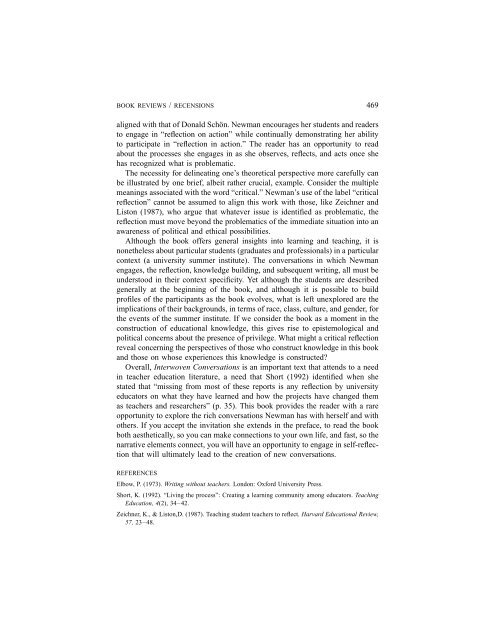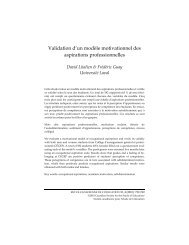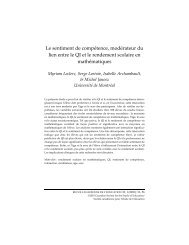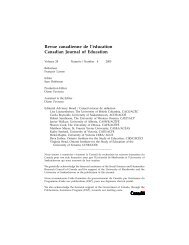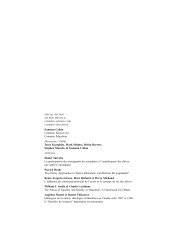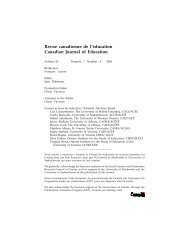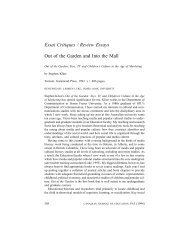Mireille Falardeau et Michel Loranger Le choix de stratégies ... - CSSE
Mireille Falardeau et Michel Loranger Le choix de stratégies ... - CSSE
Mireille Falardeau et Michel Loranger Le choix de stratégies ... - CSSE
Create successful ePaper yourself
Turn your PDF publications into a flip-book with our unique Google optimized e-Paper software.
BOOK REVIEWS / RECENSIONS 469<br />
aligned with that of Donald Schön. Newman encourages her stu<strong>de</strong>nts and rea<strong>de</strong>rs<br />
to engage in “reflection on action” while continually <strong>de</strong>monstrating her ability<br />
to participate in “reflection in action.” The rea<strong>de</strong>r has an opportunity to read<br />
about the processes she engages in as she observes, reflects, and acts once she<br />
has recognized what is problematic.<br />
The necessity for <strong>de</strong>lineating one’s theor<strong>et</strong>ical perspective more carefully can<br />
be illustrated by one brief, albeit rather crucial, example. Consi<strong>de</strong>r the multiple<br />
meanings associated with the word “critical.” Newman’s use of the label “critical<br />
reflection” cannot be assumed to align this work with those, like Zeichner and<br />
Liston (1987), who argue that whatever issue is i<strong>de</strong>ntified as problematic, the<br />
reflection must move beyond the problematics of the immediate situation into an<br />
awareness of political and <strong>et</strong>hical possibilities.<br />
Although the book offers general insights into learning and teaching, it is<br />
non<strong>et</strong>heless about particular stu<strong>de</strong>nts (graduates and professionals) in a particular<br />
context (a university summer institute). The conversations in which Newman<br />
engages, the reflection, knowledge building, and subsequent writing, all must be<br />
un<strong>de</strong>rstood in their context specificity. Y<strong>et</strong> although the stu<strong>de</strong>nts are <strong>de</strong>scribed<br />
generally at the beginning of the book, and although it is possible to build<br />
profiles of the participants as the book evolves, what is left unexplored are the<br />
implications of their backgrounds, in terms of race, class, culture, and gen<strong>de</strong>r, for<br />
the events of the summer institute. If we consi<strong>de</strong>r the book as a moment in the<br />
construction of educational knowledge, this gives rise to epistemological and<br />
political concerns about the presence of privilege. What might a critical reflection<br />
reveal concerning the perspectives of those who construct knowledge in this book<br />
and those on whose experiences this knowledge is constructed?<br />
Overall, Interwoven Conversations is an important text that attends to a need<br />
in teacher education literature, a need that Short (1992) i<strong>de</strong>ntified when she<br />
stated that “missing from most of these reports is any reflection by university<br />
educators on what they have learned and how the projects have changed them<br />
as teachers and researchers” (p. 35). This book provi<strong>de</strong>s the rea<strong>de</strong>r with a rare<br />
opportunity to explore the rich conversations Newman has with herself and with<br />
others. If you accept the invitation she extends in the preface, to read the book<br />
both aesth<strong>et</strong>ically, so you can make connections to your own life, and fast, so the<br />
narrative elements connect, you will have an opportunity to engage in self-reflection<br />
that will ultimately lead to the creation of new conversations.<br />
REFERENCES<br />
Elbow, P. (1973). Writing without teachers. London: Oxford University Press.<br />
Short, K. (1992). “Living the process”: Creating a learning community among educators. Teaching<br />
Education, 4(2), 34–42.<br />
Zeichner, K., & Liston,D. (1987). Teaching stu<strong>de</strong>nt teachers to reflect. Harvard Educational Review,<br />
57, 23–48.


